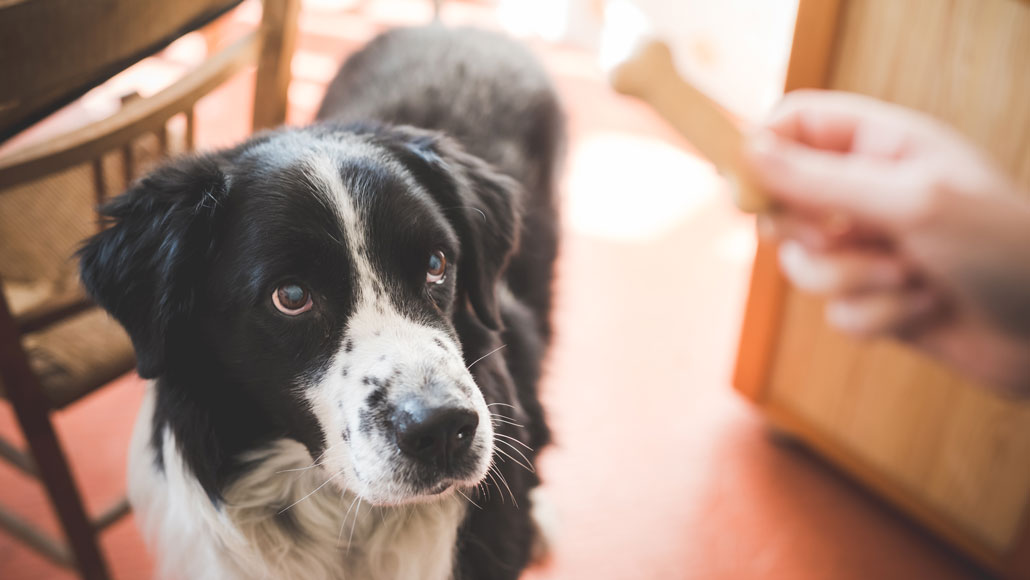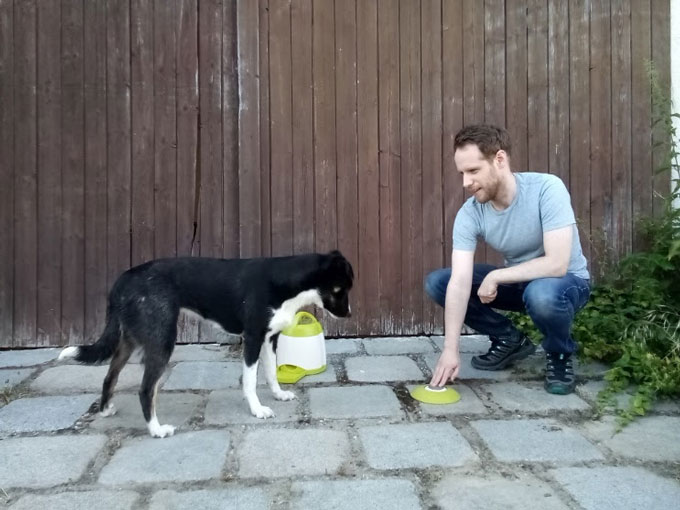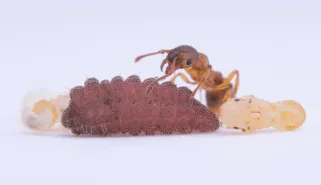
Would your dog give you a treat if he had the opportunity? A new study suggests it might depend on how you ask.
Eugenio Marongiu/Getty Images Plus
Dogs may not be inclined to return favors to people, at least when it involves food.
The result, published July 14 in PLOS ONE, is somewhat surprising since a previous study showed dogs will return favors in the form of food to other dogs. In other studies, dogs helped their owners when the people appeared to be trapped, and canines were able to distinguish between helpful and unhelpful people. So it seems reasonable to think dogs might reciprocate good deeds by humans.
To find out, comparative psychologist Jim McGetrick and colleagues at the University of Veterinary Medicine, Vienna trained pet dogs how to use a button to get food from a nearby dispenser. Each dog was then paired with a human, visible in an adjacent enclosure, who pressed the button to dispense food in the dog’s enclosure. On separate occasions, the dog was also paired with another human who didn’t press the button. When it was the dogs’ turn to offer food to their human partners, the canines were no more likely to press the button to provide food for the helpful human than for the stingy one.
Why didn’t dogs return the humans’ food favors? It may be that they aren’t willing to, or perhaps aren’t able to form this sort of complicated tit-for-tat social contract with humans. Or, there’s another possibility, the study authors note: The dogs simply may not have understood what was being asked of them, which could come down to how the experiment was designed.
Science News talked to McGetrick about the challenges of testing whether animals like dogs are capable of complex social behaviors. His answers have been edited for clarity and length:
SN: What aspects of the experiment may have influenced why a dog didn’t return the favor for a human?
McGetrick: One possible explanation is the fact that dogs don’t provide humans with food. We feed them all the time, but it’s not something natural that they do. At the same time, dogs have been shown to reciprocate the receipt of food with other dogs [even though] adult dogs also don’t normally provide food to other adult dogs. So, if one applies the argument that this is an unusual setup because dogs don’t provide food to humans, I think one also needs to explain why it would be normal for a dog to provide food to another dog.
SN: If trading food wasn’t the problem, what else could have been at play?
McGetrick: Another possible explanation for why they didn’t reciprocate is that the setup is very abstract. In a lot of previous reciprocity studies, there were very clear physical mechanisms: You pull a rope which pulls a tray, or a box opens if you press a lever. The dog’s physical connection with the mechanism is very obviously connected to the outcome, so that could be way easier for dogs to understand. In our case, we used the food dispenser where the connection was not that obvious. Having said that, the dogs all learned to press the button and get the food. What they understand about it is another question.

SN: Are there other elements of the experiment that the dogs might not have understood?
McGetrick: I’m not sure that the dogs understood that another individual was helping them. It seemed they certainly saw the human. But even if the dogs look, they might see the human’s face, they might see the human’s hand pressing the button, but they might never register that, “Oh, that’s how I’m getting the food,” or “Oh, the human is doing something for me.” It’s very difficult to know what they understand about the situation.
SN: Do you plan to follow up on any of these possible explanations?
McGetrick: At the moment, we’re running basically the same study but using dogs as the partners [rather than humans]. You can boil our result down to two possibilities. One is that there were methodological issues. Or this is just the answer to the question: Will dogs reciprocate help received from humans? And one way to really answer that is to test them with other dogs with this setup. With the same setup, we should see reciprocity with other dogs. And if we don’t see reciprocity with other dogs as partners, then it would point more towards methodological issues.
SN: How difficult is it to settle on a design for an experiment?
McGetrick: These are very artificial setups where you’re just trying to get at something real, something that reveals something about nature and reality. And there are maybe 100 of these tiny decisions you make along the way, and so many of them are just intuition. And those minor decisions you make could be the difference between a positive result or a negative result.
SN: Publishing negative results is somewhat uncommon. Why do you think it’s important?
McGetrick: My feeling is that it’s becoming more common, particularly in the field that I work in. If a study is designed well, structured well and addresses a question, there’s no reason for it not to be published regardless of the result. And it is a big problem if results aren’t published because they’re negative; it hides a lot of important information. The result is the result. You can explain the reasons why you might have gotten that result, but it shouldn’t really matter either way.






